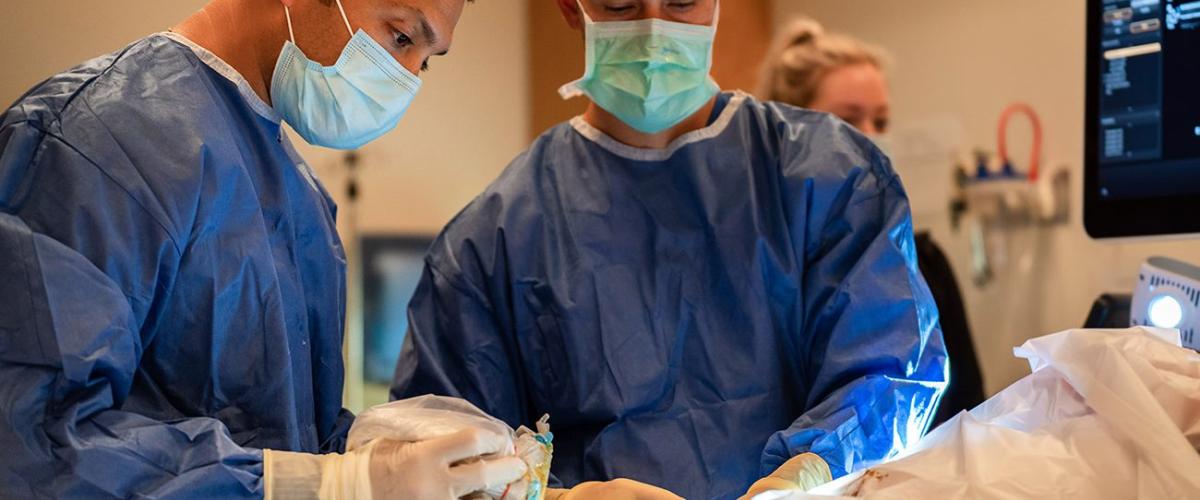
The medical campus, located on Duke’s beautiful undergraduate campus, includes Duke Hospital (a 1,000-bed tertiary and quaternary care hospital), Duke Central Tower (a 350-bed, 11-story bed tower addition), Duke Medicine Pavilion (a critical care and surgery expansion with 160 high acuity beds, 16 operating rooms, and the Duke Cardiovascular Magnetic Resonance Center), Duke Cancer Center, Duke Eye Center, Duke Children’s Hospital, and Duke Outpatient Clinics.
Duke Radiology is a highly specialized, full-service department, committed to providing outstanding care 24 hours a day utilizing state-of-the-art technology and subspecialty expertise.
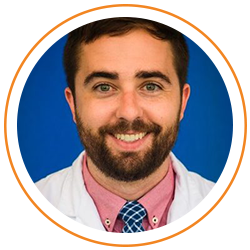
David Peterson, M.D.
CLASS OF 2021
"Duke Radiology is an amazing place to train. The teaching is excellent, including the one-on-one instruction that we get during readouts and the fantastic group lectures. Independent call is crucial to becoming a capable and confident radiologist. And the volume and diversity of cases we see at Duke ensures that anyone who trains here will be ready to thrive in any practice setting."
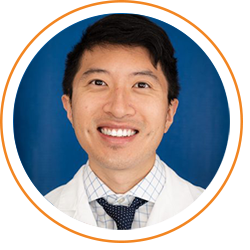
Jesse Zhao, M.D.
CLASS OF 2026
"I chose Duke because of its graduated true independent call system which trains us to be more than ready to handle the high clinical volume and case complexity of a tertiary care center. In addition, the faculty are national experts in their field who are passionate about teaching both at the work station and in didactic sessions. I feel confident that after graduation, my class and I will feel equipped to handle any practice setting we choose to enter."
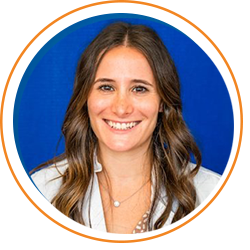
Rose McNulty, M.D.
Class of 2025
"Training at Duke is easily the best decision I have made in my medical career. There is the dedication to maintaining independent call, which I believe is vital to shaping a radiologist’s own confidence, personal growth, and ability to handle a high volume of complex cases. Additionally, despite being well-known leaders in the field, faculty treat you as a colleague and prioritize resident teaching."
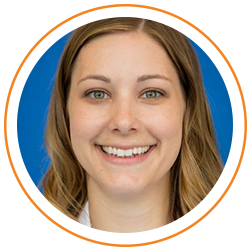
Marybeth Nedrud, M.D., Ph.D.
Class of 2023
"I chose Duke for residency because I wanted to receive world class training in radiology and research, while working within a community that emphasizes personal health and growth. The learning environment at Duke challenges me to become a better physician on a daily basis, but also gives me the support I need to develop into a well-rounded person outside of the reading room."
CLINICAL ROTATIONS
Each year, residents rotate through thirteen clinical rotations. Please explore the table below and scroll to the right to see the full clinical curriculum.
|
Rotation |
R1/PGY-2 |
R2/PGY-3 |
R3/PGY-4 |
|
1 |
Body CT |
Body CT |
Body CT |
|
2 |
Breast |
Breast |
Breast/Cardiovascular Imaging |
|
3 |
Cardiothoracic/CVI |
Cardiothoracic/CVI |
Body MR |
|
4 |
Cardiothoracic/CVI |
Cardiothoracic/CVI |
Cardiothoracic/CVI |
|
5 |
GI (Fluoroscopy) |
Independent Call |
GI (Fluoroscopy) |
|
6 |
MSK |
MSK |
MSK |
|
7 |
Neuroradiology/Procedures |
Neuroradiology |
Independent Call |
|
8 |
Neuroradiology |
Neuroradiology |
Neuroradiology |
|
9 |
Nuclear Medicine |
Nuclear Medicine/Night Float |
Nuclear Medicine |
|
10 |
Pediatric |
Pediatric |
Pediatric |
|
11 |
Ultrasound |
Ultrasound |
VA (CT) |
|
12 |
VIR |
VIR |
Independent Call |
|
13 |
VA (Chest/MSK) |
VA (Fluoro/MSK MR) |
VA (MR/US) |
- In R4 year, there will be required time for independent call and other diagnostic rotations including nuclear medicine and breast imaging. However, all residents can dedicate significant time to vigorous and novel scientific research investigation, specialty pathways including our ESIR curriculum, our 16-month dual certification pathway in diagnostic radiology and nuclear medicine, our 15-month dual certification pathway in diagnostic radiology and pediatric radiology, an informatics fellowship, a clinician-educator pathway, a global-health elective through the Duke Global Health Institute, or one of our many available mini-fellowships.
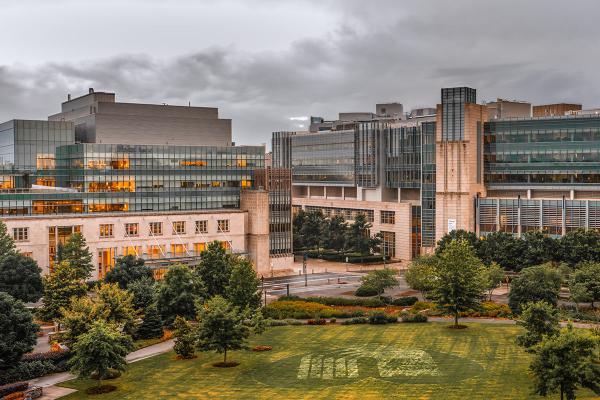
CALL SHIFTS
Duke Radiology prides itself in maintaining independent call when residents render high quality preliminary interpretations, significantly directing patient care and influencing outcomes without the supervision of an attending. This is a unique strength of our program that allows our residents to mature into independent radiologists, ready to hit the ground running following graduation. Call shifts are structured so that residents have graduated responsibilities as they progress through residency, eventually becoming prepared and confident to take autonomous call.
Service Day
- Hours: 7:30a -12:00p (either Saturday or Sunday)
- Responsibilities:
- Overnight cross-sectional and plain film studies and any morning studies
- Read out with attending at the end of shift
Weekend
Service Day
- Hours: 7:30a -12:00p (either Saturday or Sunday)
- Responsibilities:
- Overnight cross-sectional and plain film studies and any morning studies
- Readout with attending at the end of shift
Box Shift
- Hours: 12:00p - 9:00p
- Responsibilities
- Adult and Pediatric ED Plain Films
- Trauma CT Thoracolumbar Spine Reformats
- Ultrasound
- Emergent fluoroscopic examinations
- All STAT inpatient plain films
- Read out ED films with an attending throughout the shift
Junior Day
- R2/PGY-3 are assigned to this shift in the 2nd half of the academic year
- Hours: 2:30p - 9:30p
- Responsibilities
- Render preliminary interpretations on all inpatient/ED CTs, MRIs, and nuclear medicine studies
Evening
Late shifts
- Neuroradiology
- Hours: 3:30p - 10:00p
- Responsibilities
- All Neuro CTs and radiographs
- Read out studies with an attending at the end of the shift
- Abdominal Imaging
- Hours: 2:00p - 10:00p
- Responsibilities
- All body CTs and STAT MRIs
- Ultrasound (studies performed 4:30p - 5:00p)
- Read out studies with an attending the following morning
- Cardiothoracic/Cardiovascular Imaging
- Hours: 3:00p - 10:00p
- Responsibilities
- All Thoracic and Vascular CT and MRI
- Read out studies with an attending the following morning
Box Shift
- Hours: 5:00p - 9:00p
- Responsibilities
- Adult and Pediatric ED Plain Films
- Trauma CT Thoracolumbar Spine Reformats
- Ultrasound
- Emergent fluoroscopic examinations
- Readout ED films with an attending throughout the shift
Overnight
Junior Nights
- Hours: Saturday - Friday 9:00p - 6:30a (two-week blocks)
- Responsibilities
- Adult and Pediatric ED Plain Films
- Ultrasound
- Trauma CT Thoracolumbar Spine Reformats
- All STAT inpatient plain films
- Emergent fluoroscopic examinations
- Read the studies out with attendings from the respective subspecialties and submit final reports in the morning
Weekend
Service Day
- Hours: 7:30a -12:00p (either Saturday or Sunday)
- Responsibilities:
- Overnight cross-sectional and plain film studies and any morning studies
- Readout with attending at the end of shift
Second Senior Day
- Hours: 2:30p - 9:30p
- Responsibilities
- Render preliminary interpretations on all CTs
- Render preliminary interpretations on STAT MRIs
- Render preliminary interpretations on STAT Nuclear Medicine
Senior Day
- Hours: 12:00p - 7:30p
- Responsibilities
- Render preliminary interpretations on all CTs
- Render preliminary interpretations on STAT MRIs
- Render preliminary interpretations on STAT Nuclear Medicine
Evening
Late shifts
- Neuroradiology
- Hours: 3:30p - 10:00p
- Responsibilities
- All Neuro CTs and radiographs
- Read out studies with an attending at the end of the shift
- Abdominal Imaging
- Hours: 2:00p - 10:00p
- Responsibilities
- All body CTs and STAT MRIs
- Ultrasound (studies performed 4:30p - 5:00p)
- Read out studies with an attending the following morning
- Cardiothoracic/Cardiovascular Imaging
- Hours: 3:00p - 10:00p
- Responsibilities
- All Thoracic and Vascular CT and MRI
- Read out studies with an attending the following morning
Swing Shift (average 2-3 weeks during R3/PGY-4 and R4/PGY-5):
- 1 week blocks
- Hours: Saturday-Friday 7:30p - 2:00a
- Responsibilities
- 7:30p - 9:00p
- Render preliminary interpretations on Pediatric and MSK cross-sectional
- Render preliminary interpretations on Nuclear Medicine
- Pop off valve for Late Shifts (neuro, abdominal, chest outpatient studies)
- 9:30p - 2:00a
- Shared responsibilities with the Senior Night shift
- Overnight procedures are the shared responsibility of the Junior and Senior resident
- 7:30p - 9:00p
Overnight
Senior Nights (2 weeks during R3/PGY-4 and R4/PGY-5):
- 1 week blocks
- Hours: Saturday-Friday 9:30p - 7:30a
- Responsibilities
- Render preliminary interpretations on all CTs
- Render preliminary interpretations on STAT MRI and Nuclear Medicine
- Overnight procedures are the shared responsibility of the Junior and Senior resident
IMAGINE YOUR FUTURE AT DUKE RADIOLOGY!
We sincerely hope that you will consider joining our Duke Radiology community.
Please click on the link below to learn about our application and interview process. We also encourage you to contact us for more information about our program.